One is the loneliest number in Mascha Schilinsky’s superb second feature, a fractured reflection on childhood and family that eschews linear narrative for immersive atmosphere, telling the story of four young girls from different eras whose lives play out, in the words of Harry Nilsson, by making rhymes of yesterday. Cinema is too small a word for what this sprawling yet intimate epic achieves in its ethereal, unnerving brilliance; forget Cannes, forget the Competition, forget the whole year, even—Sound of Falling is an all-timer.
The one constant in a kaleidoscopic timeline that plays out across a hundred years is a farmhouse in northern Germany, established in the opening scenes — perhaps in the ’30s or ’40s — as home to Erika (Lea Drinda), who amuses herself by binding her left leg and walking on her Uncle Fritz’s crutches. Fritz, an amputee, is largely bedbound and suffers night terrors, a casualty of the First World War, but not in the way you might think. So far, everything is fairly traditional, like any other well-appointed period drama. Things suddenly take a bizarre turn, however, when Erika seems to break character, looking into the camera — and smiling.
RELATED: Cannes Film Festival 2025: Read All Of Deadline’s Movie Reviews
From here we flash back to a time when little Alma (Hanna Heckt) lived there with her sisters. Nothing is explained, but from their dress it appears to be the early 20th century, perhaps sometime during or even before the First World War. Alma’s mother is throwing a party for All Soul’s Day and has put out a special black dress for her youngest daughter to wear. The mantelpiece is full of photographs of deceased relatives, but one in particular stands out: the body of a little girl, propped up on a sofa with a doll. It’s a macabre tableau, made even stranger by a creepy double exposure that transforms the woman behind her (is it Alma’s mother?) into a faceless kind of ectoplasm.
The little girl looks like Alma, and her sisters tell her that it is her. But how can that be? It’s the first of many mysteries, the most likely explanation being that, given the high infant mortality rate of the time and the haunting image of a little boy in a coffin that recurs, Alma’s mother has lost more than one child along the way. But while Alma is pondering this, the film shifts its attentions to the present day, where Lenka (Laeni Geiseler) and her little sister Nelly (Zoë Baier) live with their parents. The farmhouse is now something of a fixer-upper, and we can tell from the horribly dated décor that the place hasn’t had much love since the Cold War. This is our cue for another timeslip; the next period is some undefined postwar period where we meet Angelika (Lena Urzendowsky), Erika’s niece.
From here, Schilinsky engages in a weird but effective kind of hypnosis, showing the life cycle of a family home through the eyes of the young girls who lived there. Phrases and situations repeat in different periods, and, in the boldest strategy of all, the girls’ voiceovers — as if speaking to us from beyond the grave — don’t always tally with what we see. Memory, like time, is an abstract concept here, and Fabian Gamper’s restless camera has a ghost-like presence, always observing and yet never quite telling, shooting sometimes in such little light that it’s hard to see what’s happening in the gloom.
Given the subject matter, death is everywhere — a fair enough reflection of the morbid interior lives of young girls still drawn, like moths, to books like The Bell Jar and films like The Notebook — but what’s real and what’s imagined is left for the viewer to decide (Angelika, especially, devises a devastating end for herself in a cornfield). An obvious comparison is Sofia Coppola’s debut film The Virgin Suicides, and one can also make a case for Peter Weir’s enigmatic Picnic at Hanging Rock, which is much closer in spirit. But Schilinsky’s film is absolutely its own beast, that rare film that has no music except for one startlingly wonderful song (“Stranger” by Anna Von Hausswolff), resting instead on a mix of ambient clicks and hums that give the film a low-fi analog quality that fits just perfectly with its Proustian themes of les temps perdus.
One viewing might not be enough, two will certainly make things a bit clearer, but Sound of Falling — like its moody title — is not a puzzle waiting to be solved. Instead, it’s an exhilarating experience, frustrating at times, but in the best, most challenging way. If Terence Davis and David Lynch made a movie together, it would look and sound like this. Quite frankly, there’s no higher praise than that.
Title: Sound of Falling
Festival: Cannes (Competition)
Director: Mascha Schilinsky
Screenwriters: Mascha Schilinsky, Louise Peter
Cast: Hanna Heckt, Lea Drinda, Lena Urzendowsky, Laeni Geiseler, Zoë Baier, Luise Heyer, Susanne Wuest
Sales agent: MK2
Running time: 2 hr 29 min
Content shared from deadline.com.

